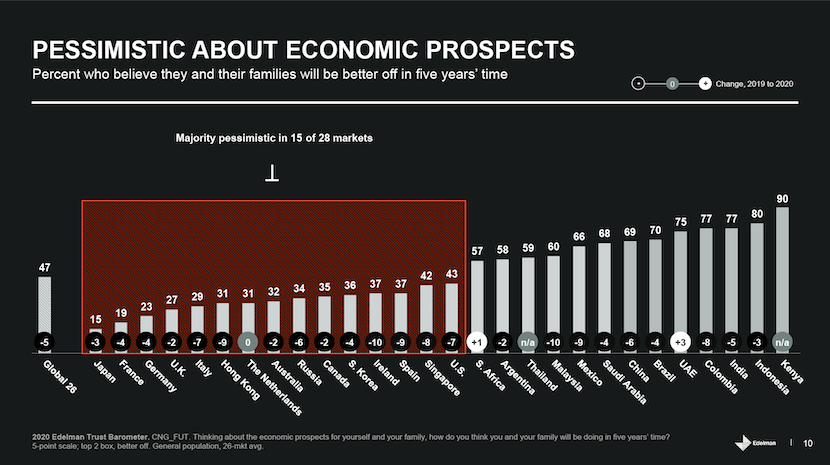 Economic development has historically built trust among nations’ citizens. But in developed, wealthier parts of the world, like the U.S., “a record number of countries are experiencing an all-time high ‘mass-class’ trust divide,” according to the 2020 Edelman Trust Barometer.
Economic development has historically built trust among nations’ citizens. But in developed, wealthier parts of the world, like the U.S., “a record number of countries are experiencing an all-time high ‘mass-class’ trust divide,” according to the 2020 Edelman Trust Barometer.
For 20 years, Edelman has released its annual Trust Barometer every year at the World Economic Forum in Davos, recognizing the importance of trust in the global economy and society.
Last year, it was the employer who was the most-trusted touch-point in citizens’ lives the world over, I discussed in Health Populi one year ago. This year, even our employers can’t be trusted so much, the poll found, due to peoples’ concerns about the growing gig economy; adoption of AI, machine learning and robotics; and growing concerns about immigration’s impact on workers and (potential lowering) wages. Together, these three factors erode workers’ confidence in jobs and their personal household economies and financial health.
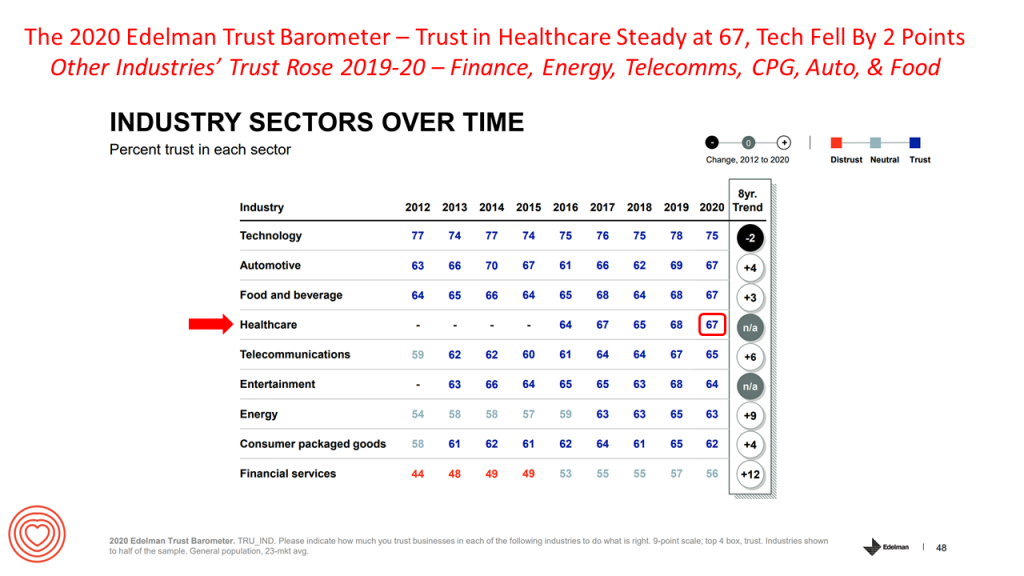 The second chart comes from the study, quantifying global citizens’ trust levels by industry sector since 2012. Note that peoples’ faith in healthcare remained steady from 2019 to this year (just a 1 point decline in the index). Technology was the only industry whose trust-equity fell in the year. But consumers’ trust with other industries, especially finance, energy and telecomms, grew in the past year.
The second chart comes from the study, quantifying global citizens’ trust levels by industry sector since 2012. Note that peoples’ faith in healthcare remained steady from 2019 to this year (just a 1 point decline in the index). Technology was the only industry whose trust-equity fell in the year. But consumers’ trust with other industries, especially finance, energy and telecomms, grew in the past year.
Another lens on “who’s trusted” in terms of information sources finds once again that journalists and governments are not go-to touch points for “facts.” Who is trusted? Academic experts and technical experts.
In health care, these would be our honest-and-ethical front-line workers — nurses, physicians, and pharmacists, the latest Gallup Poll on the question learned (described here in Health Populi). In pharma and biotech, those “experts” would be scientists doing R&D and those folks who understand the data underneath the discoveries. To that point, note that Edelman found in last year’s Trust Barometer that biotech was held to a much higher trust level than pharma within the larger healthcare industry segment. Part of consumers’ perceptions between the two industries could be peoples’ perceptions that the “tech” in “biotech” means more science and technical expertise, compared with Big Pharma being painted with a brush of DTC marketing, advertising and a lower science threshold.
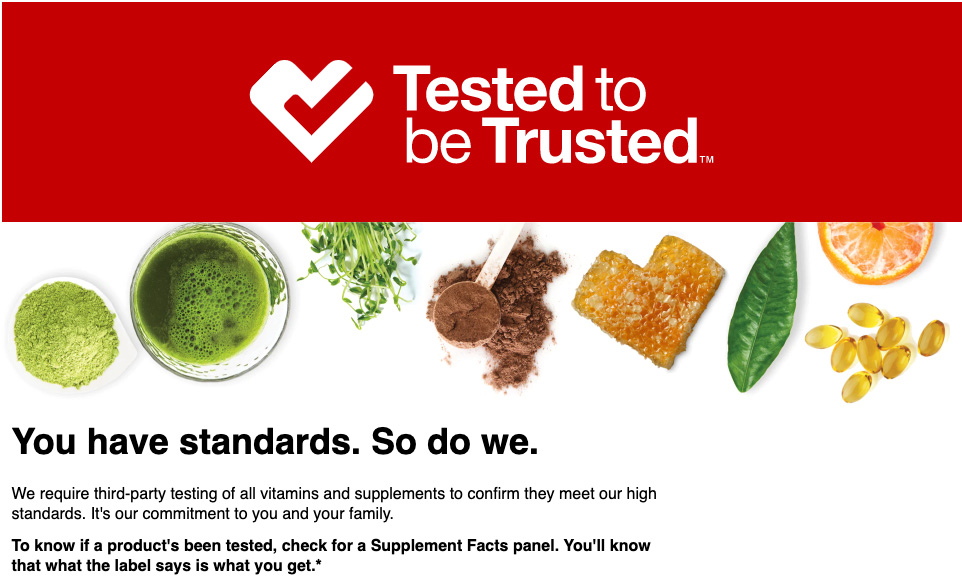 Health Populi’s Hot Points: Since CVS/pharmacy morphed into CVS/health when it quit tobacco five years ago in 2014, I began to intuit a shift in the U.S. where private sector organizations began to more visibly take on public health objectives and missions.
Health Populi’s Hot Points: Since CVS/pharmacy morphed into CVS/health when it quit tobacco five years ago in 2014, I began to intuit a shift in the U.S. where private sector organizations began to more visibly take on public health objectives and missions.
In 2019, Walmart took a stand when it re-imagined its sporting equipment and hunting aisles to stop stocking certain firearms. In the same year, Walmart expanded its community-based approach to health and wellness, relaunching Walmart Health primary care clinics and expanding mental health services.
The Business Roundtable’s recent signing of a manifesto stating that companies’ interests should go beyond financial shareholders, covering local community residents and other external stakeholders, is another sign that the private sector is paying attention to The Commons and a more civil society. Health and well communities are integral to this approach in a larger paradigm of sustainability.
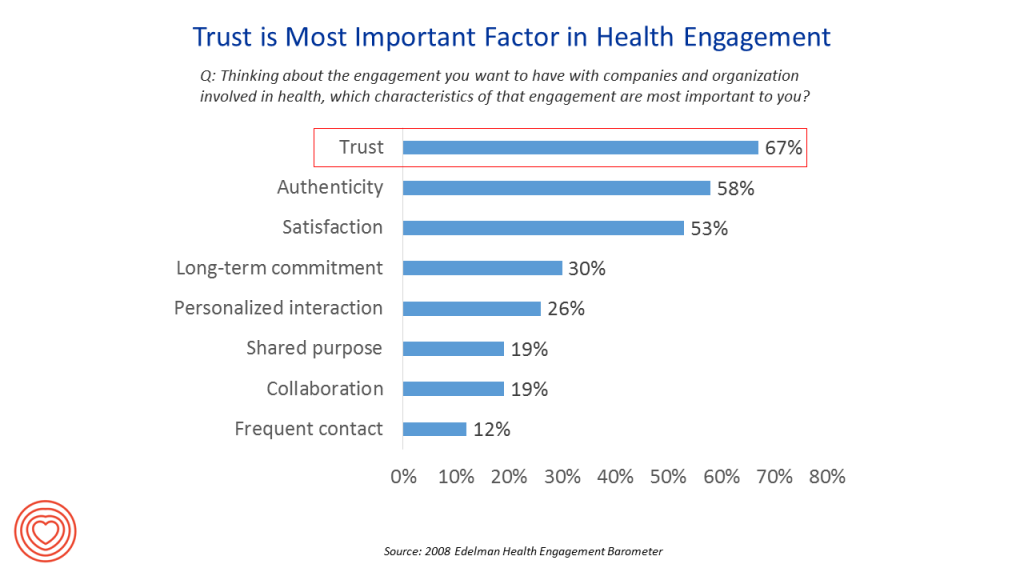 I’ve been tracking the Edelman Trust Barometer here in Health Populi for many years because trust is a precursor to health engagement, the firm’s first landmark Health Engagement Barometer observed in 2008.
I’ve been tracking the Edelman Trust Barometer here in Health Populi for many years because trust is a precursor to health engagement, the firm’s first landmark Health Engagement Barometer observed in 2008.
On a more granular level, Accenture recently gauged consumers’ trust in health care payers. “Trust fuels engagement and retention,” beyond that engendered through sound data security and privacy protections, Accenture noted in the report. “Trust gaps exist” between plan members and payers, the survey learned, depending on that payer: Medicare Advantage has earned trust in more members than have individual health plans or group coverage.
The bottom-line on trust in this study is that “trusters” are more likely to stay with their current insurer. That is, trusters will be more loyal. So trust isn’t just a “nice-to-have” feature in a health care organization’s relationship with a member, a patient, a consumer, a caregiver. Trust is the currency of growth, Accenture coins in the report’s introduction.
Stay tuned here in the next couple of months as Edelman releases more granular data on trust in the health care sub-sectors of pharma, biotech, hospitals, consumer health, and health insurance.


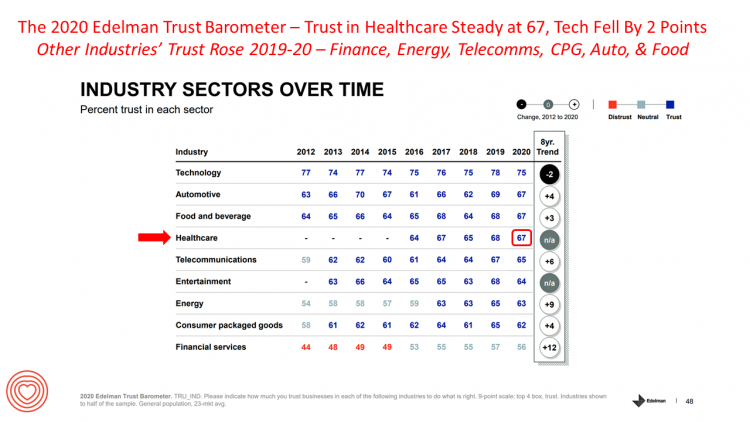


 Thank you FeedSpot for
Thank you FeedSpot for